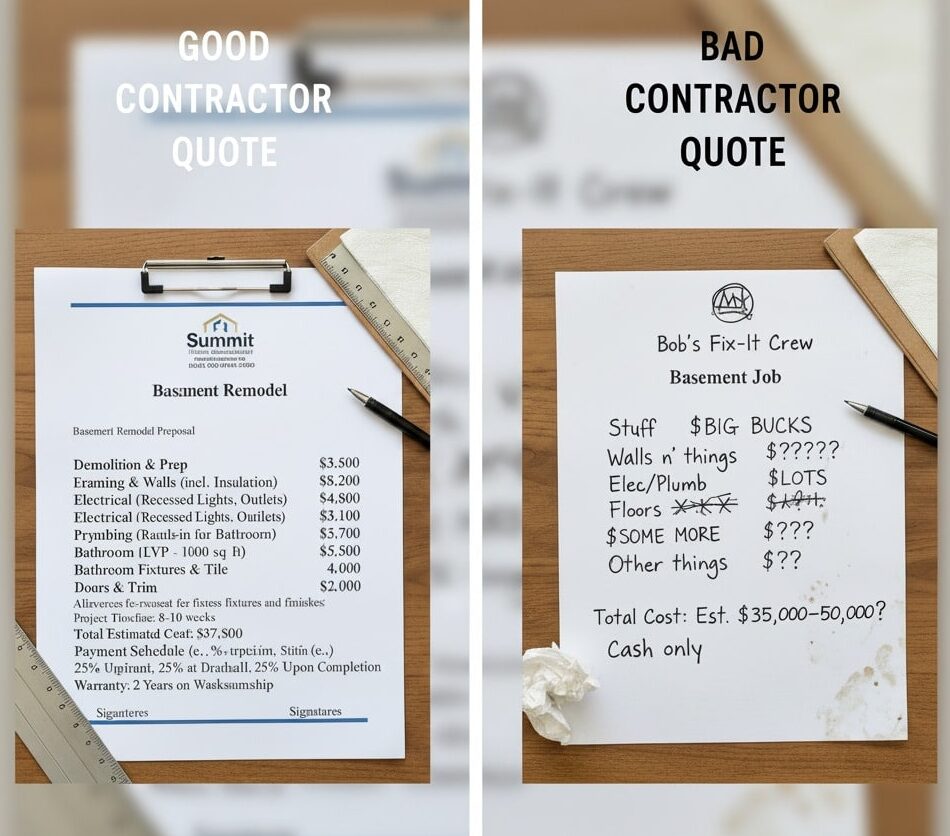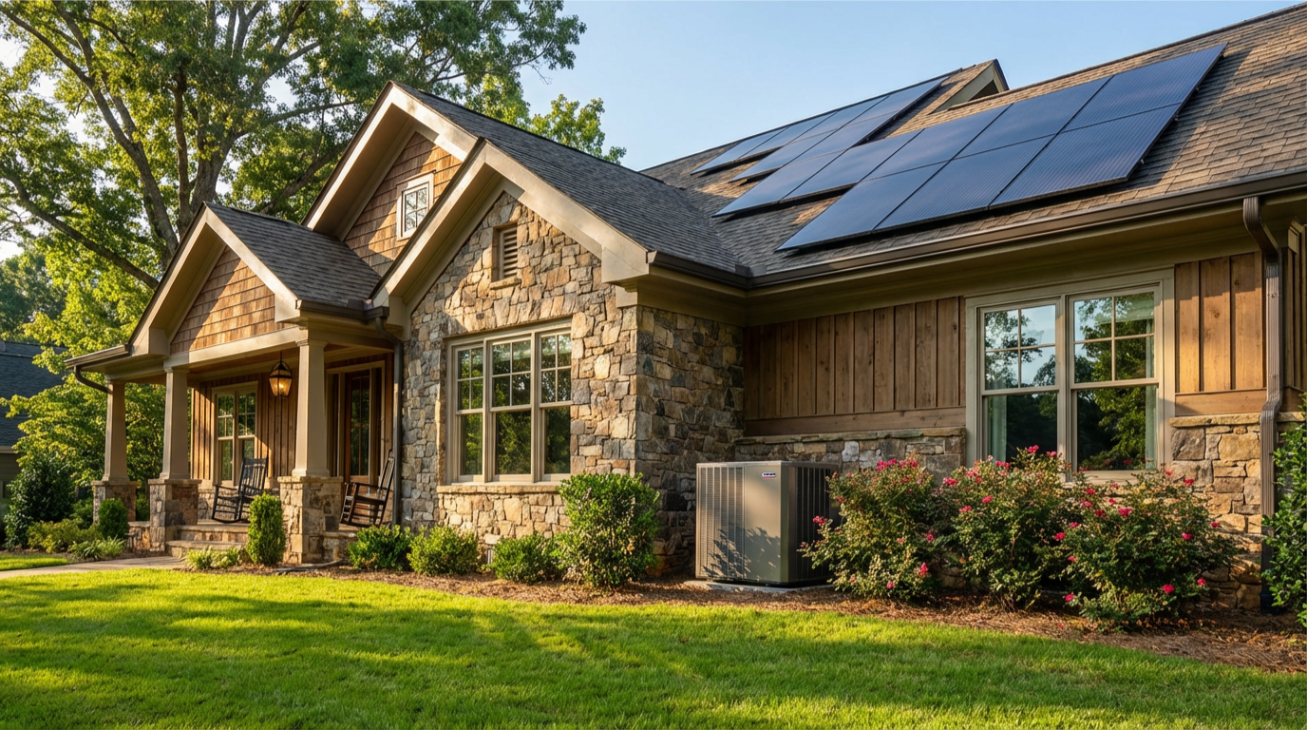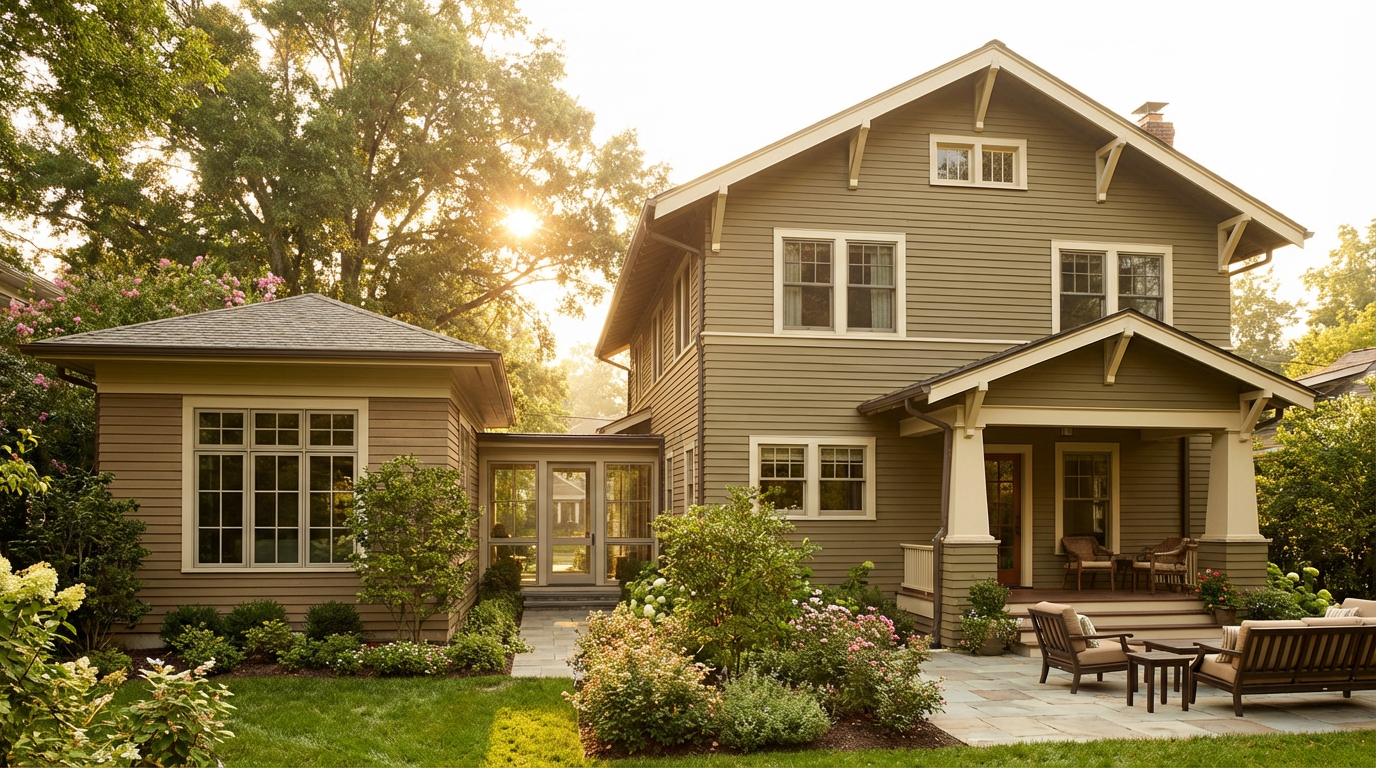Table of Contents
Don’t Want to Miss a Thing? Get Our Free Contractor Interview Checklist
Get our comprehensive 100-point checklist emailed directly to you. It covers every question you need to ask and every red flag you need to spot during contractor meetings, ensuring you never miss a critical detail that could cost you thousands.
Three contractor quotes sit on your kitchen table: $45,000, $65,000, and $52,000 for the same basement finishing project. Each one is formatted differently, filled with confusing terms like “material allowances” that make a true comparison feel impossible.
After 22 years and 5,000 basement renovation and finishing projects in Cherokee County, we’ve seen how vague basement estimates can hide thousands in unexpected costs. This guide will teach you our expert, line-by-line analysis system for evaluating basement contractor quotes. You’ll learn to decode any basement construction estimate, spot the critical red flags, and choose the right basement specialist with total confidence. No more guessing, just clear answers.
If you’re wondering why these price variations seem so dramatic, it’s essential to first understand the fundamentals covered in our Basement Remodel Costs in Woodstock, GA 2025 guide.
Why Basement Contractor Quotes Vary by $20,000+
Quick Answer: Contractor estimates vary dramatically due to different material quality levels, varying overhead costs, and inconsistent scope definitions. Professional contractors include all permits and code compliance, while others treat these as “extras.”
Understanding price variations helps you identify legitimate value differences versus red flags. For a complete breakdown of basement finishing costs in our area read about the cost of finishing a basement.
Material Quality Creates $15-25/sq ft Price Gaps
Standard vs. Premium Materials:
- Basic approach: Standard drywall, carpet, basic electrical
- Professional approach: Moisture-resistant materials, proper insulation, code-compliant systems
- Cost difference: $15-25 per square foot for long-term durability
Labor Rate Variations Reflect Business Models
Licensed vs. Unlicensed Contractors:
- Established contractors: $85-120/hour including insurance, licensing, warranties
- Unlicensed operators: $45-65/hour with no protection or guarantees
- Hidden costs: Fixing unlicensed work often costs more than hiring professionals initially
Code Compliance Costs Often Hidden
What Professional Quotes Include:
- All required permits ($150-400 in Cherokee County)
- Electrical code compliance (GFCI protection, proper circuits)
- Structural modifications for egress windows
- HVAC capacity evaluations and modifications
What Budget Quotes Exclude:
- Permit fees and inspections
- Code-compliant materials and installation
- Proper moisture management systems
- Licensed trade subcontractors
What Every Professional Contractor Quote Must Include
A professional contractor quote should include: detailed scope of work, specific materials with brand names, itemized labor costs, all permit fees, payment schedule, timeline, and warranty terms. Vague “allowances” without specifications indicate incomplete quotes. Read our entire guide on vetting basement contractors.
Learn about budgeting for a basement remodel.
Project Scope Is The Foundation of Accurate Pricing
Professional Example:
“Complete basement finishing of 800 sq ft including: framed family room (400 sq ft), bedroom with code-compliant egress window (200 sq ft), full bathroom with shower (50 sq ft), and storage area (150 sq ft). Includes all electrical, plumbing, HVAC extensions, and finishes per local building codes.”
Red Flag Example:
“Basement finishing – 800 sq ft”
Why Detail Matters: Vague descriptions lead to change orders averaging 15-25% cost increases. Specific scopes protect both parties and prevent disputes.
Structural and Framing
Essential Components:
- Wall framing: Metal stud framing at $3.50-5.50/linear foot
- Drywall installation: $2.50-4.00/sq ft including taping and finishing
- Insulation specifications: Proper R-value for basement applications
- Ceiling modifications: Beam enclosure and height optimization
Decoding “Structural Allowances”
When quotes show framing allowance, demand these specifics:
- Exact materials (metal vs. wood studs)
- Insulation type and R-value
- Labor hours and completion timeline
- Any structural modifications included
Smart Questions:
- What specific materials does this allowance cover?
- How do you handle unexpected structural issues?
- Is insulation included in the framing cost?
Electrical Systems
Essential Electrical Components:
- Panel capacity evaluation: Ensuring adequate power for new circuits
- Circuit installation: $200-400 per new 20-amp circuit
- Outlet placement: $125-200 per outlet with GFCI protection
- Lighting design: Recessed lighting, switches, specialty wiring
Understanding Electrical Allowances
An Electrical allowance should specify:
- Exact number and location of outlets
- Light fixture types and quantities
- Switch configurations (single-pole, three-way)
- Specialty wiring (USB outlets, smart home prep)
Critical Questions:
- How many outlets are included in this price?
- What’s the cost to add outlets after drywall? (Usually 3x more expensive)
- Are all GFCI outlets included where code requires?
- Does this include electrical permits and inspections?
Plumbing Work
Standard Plumbing Components:
- Rough-in plumbing: $1,500-3,500 for basic bathroom installation
- Fixture allowances: Toilet, vanity, shower with specific quality levels
- Water line extensions: $200-500 depending on distance from main lines
- Sewage ejector pump: $2,500-4,000 (often required for basement bathrooms)
Plumbing Fixture Allowances
Fixture allowance must specify:
- Toilet: Specific model and quality level
- Vanity: Size, material, countertop type
- Shower/tub: Dimensions, material, and fixture quality
- Hardware: Faucet finish and brand specifications
Basement-Specific Questions:
- Is a sewage ejector pump needed for below-grade drainage?
- How do you handle clay soil drainage issues common in our area?
- What happens if we encounter unexpected plumbing complications?
HVAC and Climate Control: Critical for Basement Success
HVAC Quote Components:
- System capacity evaluation: Professional assessment of current system capability
- Ductwork extension: $15-25/linear foot for proper distribution
- Ventilation requirements: Bathroom exhaust, general air circulation
- Humidity control: $1,500-3,500 for dehumidification systems (essential for basements)
Understanding HVAC Allowances
Complete HVAC solutions address:
- Heating and cooling capacity for added square footage
- Proper ventilation preventing moisture and air quality issues
- Independent temperature control options (zoning)
- Energy efficiency considerations
Questions to Ask
- Can our current system handle the additional load?
- What humidity control measures are included?
- How do you ensure proper air circulation in basement spaces?
Flooring and Finish Materials
Flooring Allowance Breakdown: Instead of vague “Flooring allowance: $5,000,” look for:
- Material specifications: Luxury vinyl plank (LVP), ceramic tile, or carpet with exact product lines
- Installation details: Subfloor preparation, moisture barriers, transition strips
- Quality levels: Commercial-grade materials vs. residential options
- Warranty coverage: Material and installation guarantees
Paint and Trim Specifications: Professional quotes detail:
- Paint quality: Specific brands, primer requirements, finish types
- Trim materials: MDF, solid wood, or composite with installation methods
- Completion standards: Caulking, nail filling, final touch-ups
Understanding Common Quote Terms
- “Material Allowances” Budget allocations for specific materials with upgrade/downgrade flexibility. Always get baseline specifications in writing. If flooring allowance assumes $4/sq ft materials and you want $8/sq ft options, you pay the difference.
- “Contingency Funds” Money reserved for unexpected conditions during construction. Reasonable range: 5-10% of total project cost. Red flag: Contingency over 15% without clear explanation of usage criteria.
- “Change Order Process” Requirements Written procedures for scope modifications requiring:
- Detailed documentation before work proceeds
- Labor and material cost breakdowns
- Timeline impact assessments
- Written approval from both parties
“Provisional Items” Clarification Work that might be needed but can’t be determined until construction begins. Common examples include additional waterproofing, structural modifications for code compliance, or electrical panel upgrades. Demand written estimates for potential provisional work.
Professional Quote vs. Problem Quote Comparison
Example: Detailed Professional Quote (600 sq ft basement)
STRUCTURAL WORK
- Metal stud framing (240 LF at $5.50): $1,320
- Drywall installation (1,400 sq ft at $3.00): $4,200
- R-15 faced insulation (600 sq ft at $2.00): $1,200
- Ceiling modifications and beam enclosure: $2,100
- Subtotal: $8,820
ELECTRICAL SYSTEMS
- Electrical permit and inspection fees: $200
- Three new 20-amp circuits: $900
- Twelve GFCI outlets installed: $1,800
- Eight recessed light fixtures: $1,200
- Light switches and three-way controls: $400
- Subtotal: $4,500
FLOORING AND FINISHES
- LVP flooring (CoreLuxe brand, 550 sq ft): $2,750
- Bathroom ceramic tile (50 sq ft): $800
- Professional installation labor: $1,100
- Transition strips and quarter-round trim: $300
- Subtotal: $4,950
Project Total: $18,270 + applicable taxes Timeline: 8-10 weeks including permits Warranty: 2 years workmanship, 1 year materials
Example: Problematic Vague Quote (600 sq ft basement)
- Framing allowance: $8,000
- Electrical allowance: $4,000
- Flooring allowance: $5,000
- Miscellaneous costs: $2,000
- Total: $19,000
Critical Problems:
- No material specifications or quantities
- Undefined “miscellaneous” charges
- Missing permit and inspection costs
- No timeline or payment schedule provided
- Allowances without defined scope or quality levels
7 Red Flags That Cost Homeowners Thousands
Red Flag #1: Quotes 20%+ Below Market Rates
Warning Sign: Basement finishing costs significantly below $40-65/sq ft for basic work.
Why It’s Dangerous: Low-ball quotes typically exclude:
- Required permits and inspections
- Code-compliant materials and installation
- Proper moisture management systems
- Licensed subcontractor work
Real Cost: Homeowners often pay twice, once for cheap work, again to fix code violations and quality issues.
Red Flag #2: Large Unexplained Line Items
Warning Signs:
- “Contingency fund: $5,000” (over 15% of project cost)
- “Miscellaneous expenses: $3,000” without itemization
- “Additional costs: $2,500” with no explanation
Why It’s Problematic: Experienced contractors estimate accurately. Large contingencies often hide poor planning or create opportunities for cost inflation.
Red Flag #3: Allowances Without Specifications
Example Problem: “Flooring allowance: $6,000” with no details about:
- Material brands or quality levels
- Installation methods or preparation
- What happens if you want different materials
- Whether delivery and taxes are included
What to Demand: Specific product lines, model numbers, and upgrade/downgrade policies for all allowanced items.
Red Flag #4: Missing Permit and Inspection Costs
Warning Sign: No mention of building permits, electrical permits, or required inspections.
Why This Matters: Basement remodeling requires multiple permits. Contractors excluding these costs either don’t understand code requirements or plan to skip them.
Required Permits:
- Building permit: $150-300
- Electrical permit: $100-200
- Plumbing permit: $75-150 (if applicable)
- HVAC permit: $100-200 for system modifications
Red Flag #5: Problematic Payment Schedules
Red Flag Examples:
- 50% deposit before work starts
- Cash-only payment requests
- Final payment due at project completion (no retention)
Professional Payment Structure:
- 10-15% deposit upon contract signing
- 25-30% at rough-in completion
- 25-30% at drywall completion
- 25-30% at project completion
- 5-10% retained for 30 days after completion
Red Flag #6: Pressure Tactics and Rush Decisions
Warning Signs:
- “This price is only good today”
- “We have materials left over from another job”
- Requesting immediate contract signing
- No time allowed for reference checks
Professional Approach: Reputable contractors provide detailed quotes, allow time for comparison, and encourage reference verification.
Red Flag #7: No Local Business Presence
Warning Signs:
- No local business address
- Out-of-state licensing only
- No local references from recent projects
- Unable to provide proof of local insurance coverage
Read our full guide on the most expensive parts of basement remodels.
Get Your Free Printable Contractor Interview Checklist
Don’t Risk Forgetting Critical Questions When $50,000+ Is On The Line
You now know the exact 5-phase system that separates legitimate basement contractors from the disasters waiting to happen. But when you’re sitting across from a contractor who sounds convincing, it’s dangerously easy to forget the specific questions that expose problems before they destroy your investment.
That’s why we’ve created this comprehensive 8-page Printable Contractor Interview Checklist – the same systematic evaluation tool I use to help North Atlanta families avoid contractor disasters.
What You’ll Get Instantly:
- Phase-by-Phase Interview Guide – Never miss a critical question during contractor meetings
- 100-Point Scoring System – Remove emotion and bias from your contractor selection
- Word-for-Word Reference Check Script – Get honest answers from previous customers instead of polite deflection
- Red Flag Identification Checklist – Spot warning signs that predict problems before they start
- Side-by-Side Decision Matrix – Compare up to 3 contractors objectively using key metrics
- Contract Protection Verification – Ensure every financial safeguard is in place before signing
- Print one copy for each contractor you interview. This systematic approach takes 45-60 minutes per meeting but can save you tens of thousands in contractor disaster recovery costs.
Essential Questions for Every Quote Line Item
Material Allowance Questions
- What specific products does this allowance cover? Request exact brand names, model numbers, and quality levels. Professional contractors provide detailed specifications, not vague descriptions.
- What happens if I want to upgrade or downgrade? Understand the upgrade pricing structure and whether downgrades provide credits. Get these policies in writing.
- Are installation, delivery, and taxes included? Clarify what’s included in material pricing to avoid surprise charges during construction.
- Who handles defective or damaged materials? Understand responsibility for material problems and replacement procedures.
Labor and Subcontractor Questions
- Are workers employees or subcontractors? Employee-based companies typically provide better quality control and accountability than subcontractor-heavy operations.
- What licenses do your electrical and plumbing teams hold? Verify that all trades workers carry proper state licensing for safety and code compliance.
- How do you handle worker injuries or property damage? Confirm adequate insurance coverage protects you from liability for workplace accidents.
- Who supervises daily work and makes quality decisions? Understand the on-site management structure and your primary point of contact.
Timeline and Project Management Questions
- What factors could delay the project start or completion? Understand permit processing times, material delivery schedules, and seasonal considerations.
- How do you communicate progress and handle schedule changes? Establish expectations for daily updates, progress photos, and change notifications.
- What happens if weather or material delays occur? Clarify responsibility for delays beyond the contractor’s control and timeline adjustment procedures.
- Do you guarantee completion dates? Understand penalties or compensation for significant delays caused by contractor performance.
Creating Apples-to-Apples Quote Comparisons
Step 1: Standardize Project Scope
Create Written Scope Document:
- Exact room layouts and square footage
- Specific finish quality levels desired
- Electrical outlet quantities and locations
- Plumbing fixture types and placements
- HVAC requirements and preferences
Distribute Identical Scope: Provide the same detailed scope to all contractors for accurate comparison baseline.
Step 2: Build Comparison Spreadsheet
Use our downloadable checklist to easily build your comparison spreadsheet with all the essential categories:
Category Breakdown:
- Structural work (framing, drywall, insulation)
- Electrical systems (circuits, outlets, lighting)
- Plumbing work (rough-in, fixtures, specialties)
- HVAC modifications (ductwork, controls, humidity)
- Flooring and finishes (materials, installation, trim)
- Permits and inspections (all required fees)
- Timeline and payment terms
Include Non-Price Factors:
- Warranty length and coverage
- Contractor experience and references
- Communication and project management approach
- Local licensing and insurance verification
Step 3: Identify and Resolve Discrepancies
Common Discrepancy Areas:
- Permit inclusion varies between contractors
- Different material quality assumptions in allowances
- Varying approaches to moisture control and code compliance
- Different assumptions about existing condition challenges
Resolution Process
Contact each contractor to clarify differences
- Request revised quotes with standardized assumptions
- Document all clarifications in writing
- Verify that final quotes address identical scope
Step 4: Calculate Total Cost of Ownership
Beyond Initial Price:
- Warranty coverage: Length and comprehensiveness of guarantees
- Material durability: Long-term maintenance and replacement costs
- Energy efficiency: HVAC solutions’ ongoing operational costs
- Change order risk: Quote completeness reducing surprise costs
How to Verify Contractor Credentials and References
License and Insurance Verification
Required Documentation
- Current contractor license (verify at state licensing board)
- General liability insurance ($1M minimum coverage recommended)
- Workers’ compensation insurance (if employees)
- Bond documentation (if required locally)
Note: Insurance requirements may vary by project type and local jurisdiction. Verify minimum coverage requirements for your specific project.
Verification Process
- Check license status online or by phone
- Call insurance companies to confirm current coverage
- Request certificates of insurance with your project address
- Verify bond coverage amounts and claim procedures
Reference Check Best Practices
Request Recent References: Ask for 3-5 references from projects completed within the last 12 months, preferably similar basement projects.
Essential Reference Questions:
- Did the final cost match the original quote within 5%?
- Was the project completed on the promised timeline?
- How did the contractor handle any unexpected issues or complications?
- Would you hire this contractor again for future projects?
- Are you satisfied with the quality and durability one year later?
- How was their daily communication and cleanliness?
Online Reputation Research
Check Multiple Platforms:
- Better Business Bureau (BBB) rating and complaint history
- Google Reviews (look for patterns in feedback)
- Angie’s List or HomeAdvisor ratings
- Local contractor association memberships
Red Flag Patterns:
- Multiple complaints about cost overruns
- Consistent communication or timeline issues
- Quality problems appearing months after completion
- Defensive or unprofessional responses to negative reviews
Making Your Final Contractor Selection
Evaluate Total Value, Not Just Price
Experience and Specialization:
- Years in business with basement projects specifically
- Number of similar projects completed annually
- Specialized knowledge of basement-specific challenges
- Continuing education and industry certifications
Communication and Professionalism:
- Responsiveness during the quoting process
- Clarity and detail in proposals and communications
- Problem-solving approach to project challenges
- Professional appearance and organization
Local Reputation and Accountability:
- Established local business presence
- Community involvement and referral network
- Financial stability and longevity
- Accessible for warranty and service issues
Decision Framework
The Right Contractor Provides:
- Competitive pricing within market ranges (not necessarily lowest)
- Complete transparency in all quote components
- Proven local experience with area requirements and challenges
- Professional communication and systematic problem-solving approach
- Strong references from recent, similar projects
- Proper licensing, insurance, and warranty coverage
Warning Signs to Avoid:
- Pressure for immediate decisions
- Significantly low pricing without clear value explanation
- Poor communication or unprofessional presentation
- Inability to provide local references or verify credentials
- Vague quotes without detailed specifications
Protect Your Basement Investment with Smart Quote Analysis
Contractor quote comparison doesn’t have to overwhelm you when you understand each component and know the right questions to ask. By systematically analyzing basement remodeling quotes, identifying red flags, and comparing true value rather than just price, you can make confident hiring decisions that protect your investment.
Key Takeaways for Quote Analysis:
- Demand detailed specifications for all materials and work scope
- Verify that permits, inspections, and code compliance are included
- Question any line items over $1,000 without clear explanation
- Get everything in writing, including change order procedures
- Check references and verify licensing before making final decisions
- Focus on total value and long-term quality, not just initial price
Your basement represents a significant investment in your home’s value and your family’s comfort. Taking time to properly analyze quotes and choose the right contractor ensures your project delivers the quality, timeline, and value you expect while avoiding the costly mistakes that plague many basement projects.
Professional contractors provide transparent, detailed quotes because they have nothing to hide and everything to gain from your satisfaction and referrals.
Ready for a Quote You Can Trust?
At Artistic Construction, transparent communication starts with clear, detailed quotes that eliminate confusion and protect your interests. Our 22 years of experience in Cherokee County means we understand the unique challenges and requirements of basement projects in North Georgia.
Our Commitment to Transparency:
- Detailed material specifications with exact brand names and model numbers
- All permits and inspection costs included upfront
- Fixed pricing with comprehensive scope definition minimizing change orders
- Local references from recent basement projects in your area
- Two-year workmanship warranty with clear coverage terms
Schedule your free consultation to discuss your basement transformation goals and receive a detailed, professional quote you can understand and trust.
Call (678) 613-3424 or schedule online to get started.
Licensed Georgia Contractor • Fully Insured • BBB A+ Rating • Serving Cherokee County and North Fulton Since 2002
This guide provides general information for evaluating contractor quotes for basement remodeling projects. Individual requirements may vary based on specific conditions, local codes, and project complexity. Always verify contractor licensing and insurance before signing contracts.
Common Homeowner Questions About Basement Contractor Quotes
How do I know if a basement contractor quote is legitimate?
Look for these five essentials: detailed material specifications with brand names, all permit costs included upfront, payment schedule under 15% initial deposit, specific timeline with milestones, and local licensing verification. Professional quotes will also include warranty terms and insurance certificates.
What questions should I ask when comparing basement contractor quotes?
Ask these critical questions: What specific materials does each allowance cover? Are all permits and inspections included in the price? What’s your written change order process? Can you provide three recent local references? What warranties do you provide on materials and workmanship?
Why do basement finishing quotes vary so much in Cherokee County?
Quote variations typically stem from different material quality levels, varying overhead costs, and inconsistent scope definitions. Professional contractors include moisture management systems essential for North Georgia’s clay soil conditions, while budget quotes often exclude these critical components.
What’s included in a basement finishing allowance?
Professional allowances specify exact brands, models, and quality levels. For example, a “flooring allowance” should detail whether it covers luxury vinyl plank (specific product line), ceramic tile (brand and size), installation labor, moisture barriers, and transition strips.
What should I do if contractor quotes vary by more than 30%?
Significant quote variations usually indicate different scope assumptions, material quality levels, or work exclusions. Contact each contractor to clarify exactly what’s included and excluded. Request revised quotes with standardized scope assumptions. Be particularly wary of quotes significantly below market rates, as they often exclude essential work or use substandard materials.
Should I automatically choose the lowest bid for my basement remodel?
No. The lowest bid often excludes critical work, uses inferior materials, or comes from unlicensed contractors. Focus on total value rather than initial price. Consider contractor experience, material quality, warranty terms, and total cost of ownership over the project lifetime. The middle-priced quote often provides the best value balance.
How can I tell if contractor allowances are reasonable?
Research material costs at local suppliers to verify allowance amounts. Ask contractors for specific brand names, model numbers, and quality levels included in allowances. Professional contractors should provide detailed specifications and be able to show you exactly what products their allowances cover at showrooms or supplier locations.
How should change orders be handled during basement construction?
All changes must be documented in writing with detailed pricing before any work proceeds. Verbal agreements lead to disputes and cost overruns. Insist on written change orders that include material costs, labor hours, timeline impacts, and total cost adjustments. No additional work should begin without your written approval.




